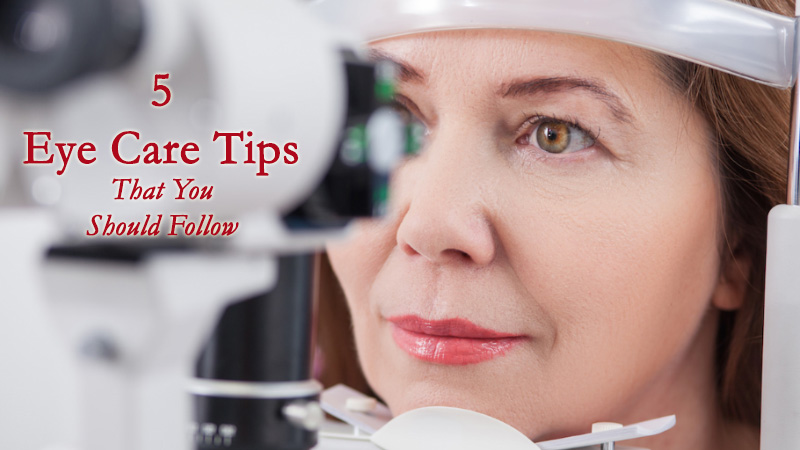5 Eye Care Tips That You Should Follow
You may believe that because you have good vision, you don’t need to worry about eye health. But often, vision problems occur after other symptoms. By the time these conditions start affecting your vision, they’re often irreversible. By staying on top of your eye health, the way you would your overall health, you can often stop serious problems before they start.

Follow these five tips to keep your eyes healthy:
1. Take Care Of Your Overall Health
Eating well and taking care of your body can help you keep your eyes strong and healthy. Getting a lot of omega-3 fatty acids, the kind found in fish and eggs or nuts, are good for your eyes. Vitamin C and E helps ward off age-related vision problems like cataracts. A well balanced diet can also help you stay at a healthy weight, lowering the risk of type 2 diabetes, which is a leading cause of blindness in adults.
2. Get Your Eyes Checked Once A Year
Even if you have good vision, you should visit an optometrist once a year. Yearly checkups can keep your doctor aware of any problem with your retina, your optic nerve, and your eye pressure. Even when your vision is perfect, regular checkups can help spot problems in the veins or muscles behind and around the eye, which help keep your vision strong for years to come. If you haven’t seen an optometrist in a while, check in with http://www.eye7.in/eye-hospital-near-me/ to point you in the right direction.
3. Understand the Difference Between Your Contact Lenses And Your Glasses
Many people might not know that their contact prescription is different from their glasses. Your contacts sit on your eyes, but your glasses are a few inches from them. Depending on the degree of your refractive error, and whether or not you have an irregularly shaped cornea, also known as an astigmatism, this could be a huge difference in your vision. Getting the wrong prescription for your contacts can lead to exacerbated vision problems, headaches, and other health issues later on.
4. Visit an Ophthalmologist When You Have Problems
The major difference between your optometrist and your ophthalmologist, is that you should view an optometrist as a general practitioner for your eyes, and an ophthalmologist when the problems start. It’s your optometrist who looks over your overall eye health, and an ophthalmologist you should talk to about changes to your prescription, and any health problems your optometrist is concerned about
5. Protect Your Eyes
The best way to prevent eye problems is to protect your eyes. Wear sunglasses when the sun is bright. If you work in conditions which may affect your eyes, be sure to use appropriate gear. Don’t strain your eyes by exhaustion or overworking. Making good decisions about eye protection is the best way to prevent future problems.
Just like your overall health, eye health is all about prevention. Regular eye checkups and proper eye protection, as well as healthy habits are the best ways to protect against vision problems and blindness. It also means when you do experience problems with your eyes, you’ll be in the hands of experts, who know you, and your health, well enough to get you what you need.
